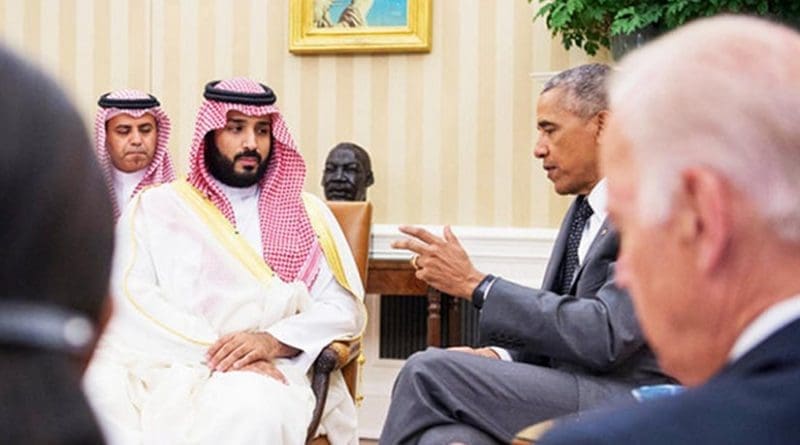Obama And Middle East Counting Losses
By Arab News
By Ben Flanagan and Siraj Wahab
Which “Barack Obama” will be best remembered in the Middle East? Will it be the Obama who dealt a heavy blow to Al-Qaeda thanks to the aggressive military operation in which its figurehead, Osama Bin Laden, was killed? The Obama who took a tougher line on Israel, at least compared to his predecessors, and who withdrew troops from Iraq — at least for a while?
Or will it be the Obama who, as some argue, left the Middle East both burning — given the bloody situations in Syria, Iraq and Libya — and in political turmoil, following the regional uproar over the Iran nuclear deal?
Critics are divided over which version of the story will be best remembered.
Columnist, analyst and political commentator Hisham Melhem, a veteran when it comes to covering US elections, is clear where he stands.
“Let me put it this way: Obama inherited a dysfunctional Middle East from George Bush and left a burning Middle East for his successor,” he told Arab News late last month.
And as the US elects the 45th president, other commentators underlined the deep divides in opinion about what Obama’s legacy will be.
“He missed many opportunities to resolve the Syrian civil war and assist Iran’s oppositional democratic movements,” Majid Rafizadeh, Harvard University scholar and president of the International American Council, said of the outgoing president.
“Obama believes that the Iran nuclear agreement would be his crowning foreign policy legacy and achievement… He put all his eggs in one basket: The nuclear deal. In reality, the nuclear agreement will more likely haunt President Obama as his worst legacy and would be viewed as one of the most threatening and failed global deals of the century.
“Obama’s appeasement policies with Iran and his reluctance to hold Iran accountable for UN resolution violations and transgressions, in order to keep the nuclear deal, has turned the regional tension into conflagration.”
Others said that Obama’s legacy will be haunted by the bloody war in Syria — an issue on which one commentator called the president’s most “egregious failure.”
“Clearly the Middle East is worse now than it was when he took over. I’m sure he would be the first to recognize this,” Ziad Asali, president and founder of the American Task Force on Palestine, said of Obama.
“There’s no question of the facts on the ground — devastation across so many different countries.
“He has not delivered, clearly… That’s why he’s so keen on having Hillary take over, because he wants her to continue his policy in general. He thinks that they are of the same mindset, which is probably right.”
Yet there are others, of course, who defend Obama’s legacy in the Middle East.
“I know many think that President Obama’s legacy in the Middle East has been, at best, mixed. But that’s because memories are short and time will only tell,” said Orlando E. Vidal, Chair of the Democrats Abroad in the UAE.
Vidal pointed to the — somewhat controversial — award of the Nobel Peace Prize to Barack Obama in 2009.
“As far as I’m concerned he has done much to deserve the Nobel Peace Prize he perhaps was prematurely awarded,” he said.
“Because memories are short, it is worth remembering that he found and dealt justly with Osama Bin Laden. He finished and won the war against the Taliban in Afghanistan. He withdrew troops from Iraq while at the same time providing all necessary assistance to eradicate Daesh.
“On the only-time-will-tell front he acted with humility and restraint in Syria, recognizing we don’t always get what we want, including getting rid of Assad and his despicable regime. And he negotiated a deal with Iran that gives everyone some breathing room and perhaps (again, only time will tell) delays or eliminates the threat of a nuclear Iran.
“A disappointment of course has been the lack of progress on the Israeli-Palestinian issue, but that has more to do with the parties to that dispute than what President Obama has or hasn’t done.”
Asali, of the American Task Force on Palestine, said that Obama had been “harder” on Benjamin Netanyahu, the current prime minister of Israel, than his previous presidents. But he said that this had not worked given that many of Israel’s actions have not been curtailed.
Asali added that the blame against Obama is deserved due to his country’s influence in the area.
“The disproportionate blame that falls on the shoulders of Obama — or any American president — is (due to) the disproportionate power that the US has globally,” he said.
But in a Middle East devastated by conflict, Asali added, “there are no clean hands.”

